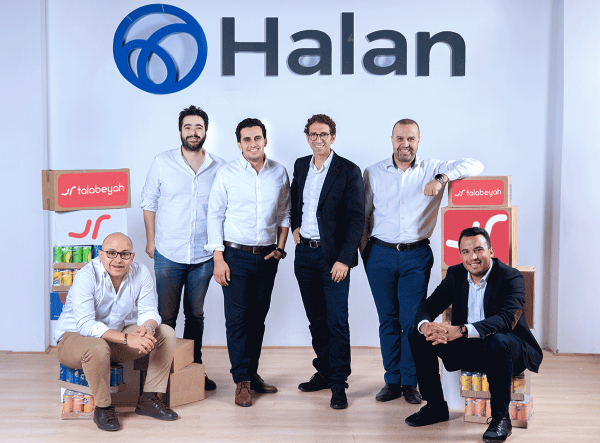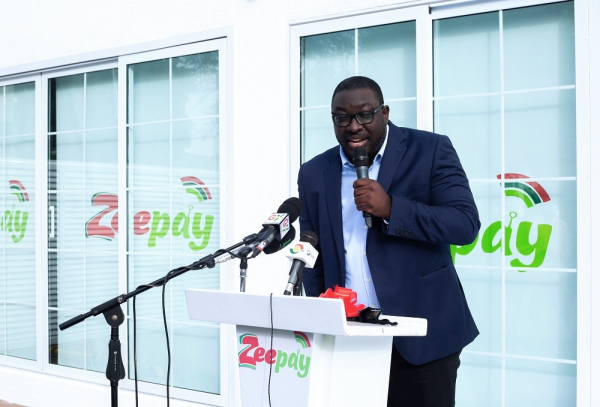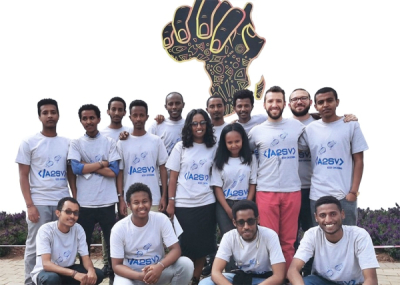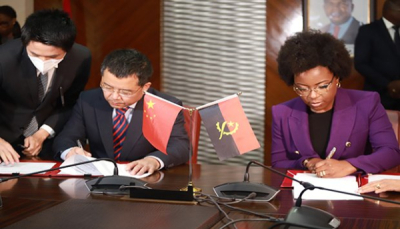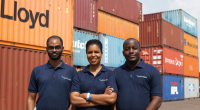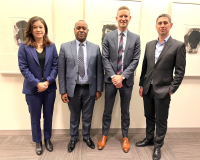
Finance (102)
The fintech startup is now Egypt's second unicorn after the e-payment platform Fawry.
Last Wednesday, Egyptian fintech MNT-Halan announced a US$400 million funding round, which helped it achieve unicorn status.
The startup founded in 2018 by Mounir Nakhla and Ahmed Mohsen said it secured US$260 million in equity financing (equity) and US$140 million in debt financing, with securitized bond issuance last year.
A single investor, Abu Dhabi-based investment fund Chimera Investments, injected about US$200 million into the start-up in exchange for a 20% stake.
"The timing of the transaction is [...] a testament to our ability to significantly increase our revenues and open new revenue streams while growing our bottom line, despite the macro-economic situation," said MNT Halan CEO Mounir Nakhla.
Thanks to this new funding round, MNT-Halan becomes the second unicorn in Egypt, after the e-payment platform Fawry.
In September 2021, it raised US$120 million from several private equity funds, including Apis Growth Fund II, Development Partners International (DPI) and Lorax Capital Partners, and venture capital funds Middle East Venture Partners, Endeavor Catalyst, and DisruptTech. Among other things, the funds secured helped it acquire the online grocery shopping platform Talabeyah. Currently, it is the leading Egyptian lender to the unbanked with over US$2 billion of loans already disbursed.
The approval comes six months after the Ghanaian fintech startup raised US$10 million from Symbiotics BV and a Mauritian fund.
Ghanaian fintech startup Zeepay recently received the Central Bank of Zambia's approval to operate in Zambia offering users the possibility to directly send funds from their mobile money wallets to over 150 countries.
According to Andrew Takyi-Appiah (photo), co-founder and managing director of Zeepay, the new service, which is the first of its kind in the world, is the result of a partnership with Moneygram International. "Our partnership with MoneyGram is helping to make Africa borderless day by day, and we are excited to be at the forefront of this revolutionary change," he said.
Zeepay operates in more than 25 countries around the world. Since its launch in 2016, it has grown exponentially. In March 2020, it became the first Ghanaian company to secure an Electronic Money Issuer (EMI) license from Bank of Ghana, the Ghanaian central bank.
In August 2022, it raised US$10 million to enter more African markets and support local banks.
Samira Njoya
After securing initial funding in 2020, the company wants to continue its expansion with additional capital.
Moroccan e-logistics start-up Cathedis recently secured US$735,000 in pre-series A funding from an investor cohort consisting of Afrimobility, a venture capital fund of AKWA Group, and CDG Invest.
According to Imad El Mansour Zekri, founder and CEO of Cathedis, the renewed support from CDG Invest, its old investor and partner, as well as the entrance of Afrimobility into its Cathedis' capital will help the startup consolidate its performance, develop its innovation platform and accelerate its growth.
In 2020, the startup secured MAD3 million (US$296,000) through CDG Invest's 212 Founders, raising the resources to achieve over 300% growth between 2020 and 2022.
In its four years of operation, the start-up has built a fully digital platform that manages all deliveries, based on a system that easily handles every operation from production to delivery, payment, and complaint handling with real-time or near-instantaneous tracking.
Cathedis has also deployed an automated 4,000-parcels-per-hour sorting center, thanks to which it serves more than 160 cities and regions in Morocco. To successfully achieve its goals, the startup turned to the association R&D Morocco, which promotes and drives innovation.
According to its CEO, it is one of the leading e-logistics operators in Morocco, with proprietary industrial and tech solutions. Its goal is to reach an annual flow of 3 million packages by 2024.
Samira Njoya
The financial support aims to encourage inclusive growth and accelerate the development of sustainable economies.
The Netherlands will provide US$10 million to the United Nations Conference on Trade and Development (UNCTAD) to help developing countries, including many in Africa, take greater advantage of e-commerce and the digital economy to facilitate business and investment.
An agreement relating to that financial support was signed on Tuesday, 17 January, by UNCTAD Secretary-General Rebeca Grynspan (photo, left) and the Dutch Minister of Foreign Trade and Development Cooperation, Liesje Schreinemacher (photo, right).
"The Netherlands appreciates UNCTAD’s contribution to global digitalization and linking it to improving business and investment opportunities. We are therefore happy to continue our support and hope other donors will follow the Netherlands in its support for this important program," Ms. Schreinemacher said.
According to the agreement signed by the two parties, US$6 million will be devoted to research and technical cooperation activities under UNCTAD's e-business and digital economy program.
An additional US$4 million will "fund UNCTAD’s efforts to strengthen digital government services for micro- and small and medium-sized enterprises (MSMEs) and international investors. It will also support enterprise development, accounting, and reporting for MSMEs to strengthen business facilitation."
In a release dated January 18, the UNCTAD explains that the Netherlands has been supporting its e-business and digital economy program for years now. The support has helped build more inclusive digital economies for women and promoted partnerships to support the development of e-business in low-income countries. It has also helped strengthen digital business and facilitated investments in six African countries and one country each in Asia and Latin America, we learn.
Samira Njoya
With digital transformation accelerating in most countries, Africa needs a highly-skilled workforce, which is experienced with concrete projects, to achieve the much-awaited fourth digital revolution.
Last Tuesday, Africa to Silicon Valley (A2SV) announced it secured funding from Google to implement its project aimed at boosting tech talent in Africa.
The foundation explained that the funding will support the establishment of a "permanent office in Ethiopia and hire more heads of education and a product manager." "The goal is to expand A2SV’s presence to Ghana and upskill 330 more students in Ethiopia and Ghana over the next two years, building a pool of highly trained, industry-ready candidates who have experience with real-life projects," it adds.
“Aspiring software developers in Africa lack access to experienced mentors and job opportunities. Academic education fails to equip them with the skills they need in real-world contexts. We address this gap through our rigorous training program comprising daily classes, boot camps, and real-life projects," said Emre Varol, A2SV founder and head of executions.
According to a report by consultancy firm Korn Ferry, the global tech ecosystem could experience a shortage of over 85 million workers by 2030. With 400 million young people aged between 15 and 35, Africa has the youngest population and can help fill that gap if its talent pool is built in time.
Africa to Silicon Valley was founded in 2019. Its priority is to build the best talent pool. It offers a rigorous training program that prepares candidates for interviews with leading tech companies. The said program covers aspects like algorithms and data structures, soft skills, and real-world projects.
Samira Njoya
The cable aligns with the government's strategy to develop the digital sector and extend competitive telecom services in remote areas.
Last Wednesday, in Luanda, China and Angola signed an about US$249 million concessional loan agreement for a national broadband project.
According to Pascoal Borges Alé Fernandes (Angola's Secretary of State for Telecommunications and Information Technology), the project will dynamize and extend Angola's network infrastructure.
"We are talking about the implementation of around 2,000 kilometers of terrestrial fiber optics that will make it possible to reach areas not yet reached by telecommunications services (…). And we also have a microwave segment that will make it possible to boost communications in Cabinda," he said.
A few years ago, Angola launched a large digital infrastructure construction project to meet the country's huge demand for digital services. With the new broadband project, the government wants to encourage tech innovation and boost productivity in the public and private sectors.
The project will help provide broadband connection in remote areas, reduce access costs and boost the country's digital economy. For China's ambassador to Angola, Gong Tao (photo, left), the agreement signed opens "new doors and new chapters" in the relations between Luanda and Pekin.
Samira Njoya
The funding is announced 18 months after the startup secured US$3 million in seed funding, including US$1 million of debt financing.
Ghanaian logistics startup JetStream Africa announced, Tuesday (January 10), it has secured US$13 million in debt and equity pre-Searies A financing.
The startup, based in Tema (Ghana) operates in 29 countries (14 African countries). With the newly secured funds, it plans to enter new markets and upgrade its platform that "vertically aggregates fragmented logistics and financing vendors in the world of African trade."
“With this funding round, we are excited to use our technology to reflect our customers’ data back to them in the form of business insights, so they can trade more profitably,” said Miishe Addy, co-founder, and CEO of JetStream.
In Africa, it is challenging for SMEs to ship their goods across international borders. As a result, they have access to only a limited number of markets. The continent's population is also larger than production capacities, therefore, the trade deficit is rising in the ever-booming market. According to a recent report by Mordor Intelligence, the African cross-border freight market is expected to grow at a compound annual growth rate of approximately 4.5% between 2022 and 2027.
With its new model, JetStream facilitates end-to-end freight, helps reduce costs and also provides funding to SMEs that need it.
According to Miishe Addy, the new investment will allow the company to expand its reach and continue to improve its service offerings. "At Jetstream we aim to help regional companies grow their supply chains faster, and close that gap themselves," she said.
Samira Njoya
The booming tech and digital sectors play an increasingly important role in East African economies. To support the countries in their projects and foster digital integration, partner institutions are committing significant funds.
The World Bank recently granted US$15 million to strengthen and accelerate regional digital integration efforts in the East African Community (EAC).
According to a statement issued by the EAC on Saturday, December 17, with that funding, the World Bank -through its Single Digital Market (SDM) initiative- wants to help the region become a deeply integrated and dynamic hub for digital investment, innovation, and growth.
For EAC secretary general Peter Mathuki, the funds will be used to create, among other things, regional digital innovation centers in all partner states to address digital challenges. "This support will further enhance the region's competitiveness and skills development that are central to successful digital transformation," he said.
Developing digital infrastructure and the economy is one of the development priorities of EAC member countries (Burundi, Democratic Republic of Congo, Kenya, Rwanda, South Sudan, Tanzania, and Uganda). Two years ago,
decided to align their tax regulations concerning the digital economy. The alignment aims to increase member countries’ revenues from the ICT sector and establish a legal framework that can help countries regulate large digital firms in the years to come.
According to a study conducted by the International Finance Corporation (IFC) in 2020, by 2025, the digital economy’s contribution to GDP would reach 9.24% in Kenya, 5.96% in Rwanda, 4.57% in Tanzania, and 4.18% in Uganda.
To achieve this, the community can rely on the World Bank and its single digital market initiative. According to the EAC release, the project will focus on the development and integration of the connectivity market, which will involve the creation of a legal, regulatory and institutional environment conducive to information technology and communication to strengthen digitization in the region.
Samira Njoya
The Malagasy government is determined to achieve its digital transformation ambitions and deploy e-governance nationwide. It also wants to give digital training to its citizens.
Last Tuesday, the IFC and the Malagasy Digital Ministry announced a partnership aimed at improving access to advanced and specialized computer training courses in the country.
The program aims to train, within two years, 6,000 people, including public and private sector employees and youth, in IT occupations such as software development, cloud architecture, data engineering, and cybersecurity.
“The project aligns with the government's commitment to better prepare for the digital economy by developing the needed digital skills and modernizing its administration to improve service delivery, boost economic growth and create much needed jobs,” said Digital Minister Tahina Razafindramalo (photo, right).
Indeed, for several years now, digital transformation has been the core of the Malagasy government’s actions. The country defined four main axes for its development programs. They are notably the digitization of public education, health and land services, the use of new technologies in agriculture, the development of technical infrastructures, and financial inclusion.
To achieve these four objectives within a short period, the government secured support from the World Bank, which pledged more than US$140 million for the various projects. According to the international financial institution, an acceleration of the digital transformation could allow the Malagasy government to create “about 140,000 new jobs linked to digital skills across nine sectors by 2027, including apparel, agri-processing, and tourism.”
Samira Njoya
Digital health systems are expanding rapidly in Sub-Sahran Africa, democratizing access to healthcare for millions of people. However, as it is not sufficiently financed, the sector is still growing to its full potential.
The Global Fund to Fight AIDS, Tuberculosis and Malaria and its private sector partners recently set up a US$50 million catalytic fund to support the digital health sector in Sub-Saharn Africa.
The fund, called Digital Health Impact Accelerator (DHIA), was announced during the Africa HealthTech Summit held in Kigali, Rwanda, on the sidelines of the Second International Conference on Public Health in Africa (December 13-15, 2022).
The fund “will help further strengthen regional and global data systems and surveillance capacity for data-driven decision-making, enable better patient care, and transform millions of lives,” said Country Technology Services Manager at the Global Fund and Lead for the DHIA.
“The Global Fund has played a key role in strengthening digital health systems and health data in low- and middle-income countries since its inception. These tools are critical to defeat infectious diseases and prevent future health threats,” he added.
Indeed, digital health is not yet fully developed and exploited in Sub-Saharan Africa. The coronavirus pandemic helped stimulate the segment and, since then, innovative e-health initiatives have multiplied. Same for the number of cell phone users. The GSM Association estimates that by 2025, there will be at least 634 million mobile users in Sub-Saharan Africa. The figures prove that digital technologies have already taken an important place in residents’ lives. Those technologies will also change habits in how they access healthcare in the near future.
Through the DHIA Catalytic Fund, the Global Fund and its private partners aim to “support countries to accelerate and scale up digital health solutions through more widespread internet access, strengthened information systems for data sharing, extensive use of mobile technologies, patient-centric digital tools, and unique patient IDs, among others.”
Samira Njoya
More...
In Africa, the ecommerce industry is booming. According to the IFC, the number of online shoppers on the continent has risen by 18 percent since 2014. This growth, fueled notably by the coronavirus pandemic, could continue over the next decade.
Last Wednesday, Gabonese ecommerce platform Olatono Market, announced it raised €45,000 to accelerate its expansion in Central Africa, strengthen partnerships and create a platform that revolutionizes ecommerce in Gabon.
"Our innovative platform differs from the existing offers. It is launched to meet the expectations of customers who are increasingly searching for solutions that give them command over their choices, enable them to compare prices and access products wherever they are in Gabon,” said Thierry Dzime, founder of Olatano Market.
The platform created in March 2021 wants to transform the ecommerce industry in Central Africa. It developed a service called Achat Flex, allowing individuals to purchase products online and pay on delivery, by installments, by mobile money, or by bank cards. It was a first in Gabon where ecommerce was gradually gaining ground.
Thanks to the funds secured, Olatano Market's managers want to develop even more services, accelerate the start-up's growth, strengthen its workforce and sign new agreements. "We are delighted to support the expansion of the company and the launch of the new product Achat Flex. The ambition is to help the future champions of Gabon’s economy emerge. We are pleased to have made these investments in a start-up with great potential. We will support its progress," said Fabrice Nze-Bekale, President of Gabon Angel Investor Network (GAIN).
According to a report by the GSMA and the Economic Commission for Africa (ECA), Gabon became the e-commerce leader in the ECCAS (Economic Community of Central African States) zone in 2021, overtaking Cameroon.
Samira Njoya
The Dubai-based company can now offer its services in Ghana since it is now complying with the local law, which requires service providers to have a presence in the country.
Tech-enabled payment solutions provider Network International Holdings will open a new office and data center in Ghana. This was announced in a release, dated December 5, issued by the holdings.
“Ghana is an exciting market for digital payments and innovation, and we are delighted to launch our office and data center to offer customers, banks, and entrepreneurs smooth and secure payment services. We look forward to supporting businesses as they grow and reach new customers,” said Addo-Quaye (photo, left), Managing Director of Network International Ghana.
With that office, the holding is establishing a local presence to provide innovative solutions that drive customer and profitability and help businesses and economies thrive by simplifying commerce and payments in the Ghanaian market.
Network International's launch in Ghana comes against a backdrop of accelerated digital transformation and increased consumer preferences for convenient, frictionless payment options. In June, Ernest Addison, the governor of the Bank of Ghana, noted that the volume of instant payment transactions has grown from 420,000 cedis (about US$52,800) in 2016 to 31.4 billion cedis in 2021. In addition, cash in circulation in the country as a proportion of gross domestic product (GDP) has dropped from 6.8 percent in 2016 to 4.7 percent in 2021, while the number of checks used per capita has dropped from 25.67 in 2016 to 18.9 in 2021.
Network International wants to take advantage of these shifts and create more partnerships with companies in the digital payments space in Ghana to offer customers more payment options and boost financial inclusion.
The company has a presence in Africa’s largest markets, including Nigeria, South Africa, Kenya, Egypt, and Ghana. It also operates in almost all of the other African countries.
Samira Njoya
The startup has developed a fintech app that allows the secured purchase, and transfer of digital assets and also enables users to save in cryptocurrencies. Its goal is to promote financial inclusion and democratize the use of digital financial assets.
Cameroonian crypto fintech Ejara announced, Monday (Nov 28), it has secured US$8 million in Series A funding.
The round, led by London-based venture capital firm Anthemis and Dragonfly Capital, had the likes of Mercy Corps Ventures, Coinshares Ventures and Lateral Capital, Circle Ventures Moonstake and Emurgo Ventures as participants.
The additional funds will be used to further democratize access to investment and savings products in Francophone Africa and the diaspora, using blockchain technology. "Financial inclusion is my utmost concern and my role is to ensure that the financial products that Africans deserve are accessible to them with just a few clicks and the lowest entry barrier,” said Nelly Chatue-Diop, CEO of Ejara.
The fundraising comes exactly one year after the company raised US$2 million in seed funding, bringing its valuation to US$10 million. According to the startup, the financial resources were used to boost the use of cryptocurrency and investment services in Francophone Africa.
Despite the recent collapse of cryptocurrencies, Ejara has seen a 10-fold increase in revenue and a 15% monthly growth in transaction volume since last October. The startup expects to grow its user base to 100,000 by the end of 2022. Currently, it boasts users from Côte d'Ivoire, Burkina Faso, Mali, Guinea, Gabon, and Senegal, as well as French-speaking Africans in the diaspora (Europe, Asia, and the United States).
Samira Njoya
According to the WHO, counterfeit medicines cause nearly 100,000 deaths in Africa each year. Grinta wants to remove this scourge by offering medicine traceability and authentication solution.
Egyptian digital pharmacy platform Grinta, announced Monday (Nov. 21), a US$8 million raise to develop its tech platform and accelerate its growth in the local market. The funds, raised during a seed round, were secured from Raed Ventures (Saudi Arabia) and NClude, an Egyptian FinTech fund managed by Global Ventures (Dubai).
"As we plan to expand our footprint in the main pharma hubs on the continent, we will also enable Egyptian and regional pharma manufacturers to further penetrate the US$50 billion African market," said Grinta co-founder and CEO Mohamed Azab.
According to the company's statement, Egypt’s US$6.3 billion pharmaceutical market (Softgroup) is the largest and fastest-growing in Africa. It has three major distributors and more than 3,000 wholesalers targeting 60,000 fragmented retail pharmacies. Nevertheless, the market is also affected by the shortage of pharmaceutical products that usually hit African countries (nearly half of Africa's population (1.1 billion people) lacks regular access to the most essential medicines).
Since its inception in 2021, Grinta has been working to reduce the drug shortage in Egypt by modernizing the pharmaceutical supply chain and empowering independent pharmacies. Its end-to-end platform provides access to the full range of traceable pharmaceutical and medical products from multiple suppliers, in addition to order fulfillment, demand planning, and inventory financing.
Thanks to the funds secured, it wants to scale its full-stack technology platform, expand its team and accelerate its growth in the Egyptian market. Within a year and a half of operation, the company has aggressively expanded across seven governorates in Egypt, with over 14,000 pharmacies registered on its platform, more than 100,000 orders delivered, and more than 14,000 stock management units.
Samira Njoya


